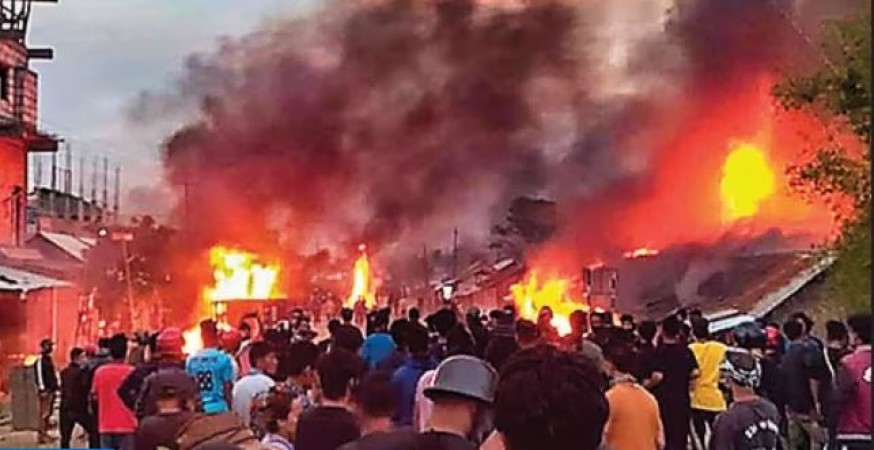
In recent times, Manipur has witnessed violent communal clashes due to the Manipur High Court's direction to pursue a 10-year-old recommendation of granting Scheduled Tribe (ST) status to the non-tribal Meitei community. The clashes have escalated following a "tribal solidarity rally" organized by the All-Tribal Student Union Manipur (ATSUM) against the alleged move to include the Meiteis in the ST list.
Manipur's Ethnic Composition:
Manipur's demographic makeup can be likened to a football stadium, with the Imphal Valley at the center representing the playfield and the surrounding hills forming the galleries. The valley, comprising about 10% of the state's landmass, is dominated by the non-tribal Meitei community, accounting for over 64% of the state's population and holding 40 out of the 60 seats in the State Assembly. On the other hand, the hills, constituting 90% of the geographical area, are inhabited by more than 35% recognized tribes but have only 20 MLAs representing them in the Assembly.
Meitei Argument for ST Status:
The Scheduled Tribe Demand Committee of Manipur (STDCM) has been demanding ST status for the Meiteis since 2012. The Meiteis were recognized as a tribe before Manipur's merger with the Union of India in 1949. They seek ST status to "preserve" their community and protect their ancestral land, tradition, culture, and language. The Meiteis express concerns over being marginalized in their ancestral land, citing a decline in their population from 59% in 1951 to 44% as per the 2011 Census data. They also fear demographic changes and shrinking of traditional Meitei areas due to infrastructure development and influx of outsiders.
Tribal Groups' Opposition to ST Status for Meiteis:
Tribal groups, including the Kuki and Naga communities, oppose the granting of ST status to Meiteis. They argue that Meiteis already possess demographic and political advantages and are academically more advanced. According to them, giving ST status to Meiteis could lead to the loss of job opportunities for tribal communities and facilitate land acquisition in the hills, potentially displacing tribal populations. Additionally, Meiteis already enjoy certain benefits associated with Scheduled Castes (SC), Other Backward Classes (OBC), or Economically Weaker Sections (EWS) status, making the demand for ST status contentious.
Process of Inclusion in the ST List:
The process of including a community in the ST list involves recommendations from the state government, followed by reviews by the Tribal Affairs Ministry and the Registrar General of India under the Home Ministry. After approval, the National Commission for Scheduled Tribes and the Cabinet review the recommendations. The final decision lies with the President's office under Articles 341 and 342 of the Constitution.
Recent Unrest and Causes:
The recent unrest in Manipur has been triggered by various factors, including disputes over forest eviction, demand for ST status for Meiteis, and issues related to the delimitation process. The intrusion of migrants from neighboring areas, the drugs problem, and historical ethnic tensions between Meiteis and tribal groups also contribute to the ongoing clashes.
Way Forward:
To address the situation and find a resolution, several measures can be considered, such as evaluating the criteria for ST status in line with recommendations from committees like the Lokur Committee and the Bhuria Commission. Increased surveillance along the border areas can help prevent the incursion of migrants, and fostering economic and diplomatic ties with neighboring countries can enhance regional stability. Peace settlement agreements with local insurgent groups and the repeal of controversial acts like AFSPA may contribute to improved human rights and a sense of ownership and belonging among the people of Manipur.
Conclusion:
The communal clashes in Manipur are rooted in complex historical, demographic, and political factors. Finding a solution requires careful evaluation of demands for ST status, addressing ethnic tensions, and promoting inclusive development and dialogue among all communities to foster peace and harmony in the state.
Spice Up Your Kitchen with Flavorful Indian One-Pot Delights
Tandoori Specials: Discover the Grilled Indian Delights That Are Captivating Food Lovers Worldwide!
Western Railway Mumbai Division will operate Jumbo block tomorrow